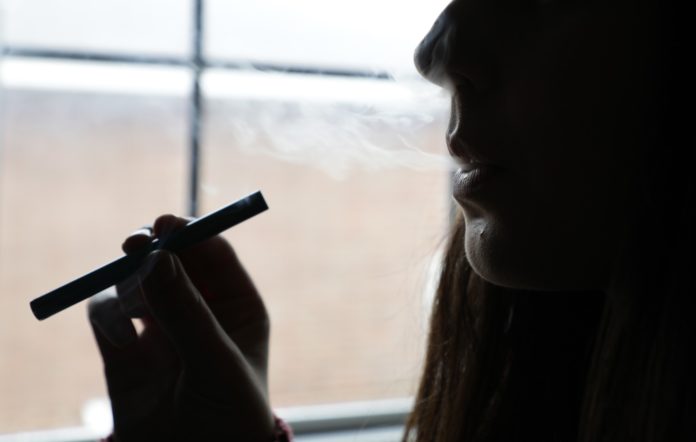
By Madalyn Watson | Staff Writer
Young adults in the United States, including Baylor students, are addicted to nicotine without even lighting a cigarette. Students are getting addicted to e-cigarettes, especially Juuls. At Baylor, the usage of e-cigarettes has doubled.
The U.S. Surgeon General Jerome Adams declared vaping an epidemic among young adults on Dec. 18 after he issued an advisory about the dangers of electronic cigarette use.
More than 3.6 million U.S. youth used electronic cigarettes in 2018, according to the advisory, and Baylor students are not excluded from this epidemic.
Lilly Ettinger, the assistant director of wellness for the Beauchamp Addiction Recovery Center (BARC), said that they began gathering information on the number students who use e-cigarettes in the fall of 2015.
“Just like the national rate, the usage for the last two years has doubled from the year before. So we’ve had these two successive years of doubling,” Ettinger said.
About 20 percent of high school students have vaped in the past month, according to a study conducted between 2015 and 2018 by the National Institute of Drug Abuse.
“Our rate isn’t that high, but it is rapidly growing,” Ettinger said.
Baylor is a tobacco-free, smoke-free campus. That means that the use of all tobacco products as well as e-cigarettes and e-hookahs, even those that do not contain nicotine or tobacco, is not allowed on Baylor property.
Ettinger said Baylor’s strict ban on nicotine from campus still hasn’t stopped the rising e-cigarette use.
Juul Labs released a clinical study on Feb. 23 that declared using Juul products just as effective as abstaining from nicotine when quitting smoking cigarettes.
The Juul is currently the most popular e-cigarette. The vape resembles a USB flash drive and takes flavored pods that contain 0.7 mL with five percent nicotine by weight. A single Juul pod has the same amount of nicotine as a pack of combustible cigarettes,
“It’s a lot easier to over-smoke, to create those mild nicotine overdose symptoms and the more severe ones,” Ettinger said.
Signs of nicotine poisoning include nausea, anxiety, headaches, dehydration and vomiting.
“If you break open like an e-cig cartridge, that nicotine can be absorbed through your hands and can very quickly become poisonous,” Ettinger said.
Depending on the severity, nicotine poisoning can require treatment at the hospital.
“There is some data showing that e-cigs are a good step-down method for older adults who are trying to quit cigarettes. But for young adults, it’s a step up, which is a problem,” Ettinger said.
Alyssa Petty, the wellness education and outreach coordinator for Baylor’s Wellness program, is a trained tobacco specialist as well as a certified health education specialist.
“Although people keep saying it’s an aid to help you quit, if something happens and you can no longer get a hold of that e-cigarette, you’re just going to go back to the traditional [cigarette],” Petty said.
Petty said although people say vaping is healthier than smoking, that does not mean it is healthy.
“I think the best analogy I‘ve got for it is: You can jump off of a 10-story building or you can jump off a 20-story building. The end result is the same,” Petty said.
Petty also said the e-cigarettes, like Juuls, are attracting people who have never smoked before because of the flavors.
“Once we saw that people were enjoying the e-cigarettes more than the combustible or traditional cigarettes, people who never smoked a day in their life were trying the e-cigarettes,” Petty said.
Juul stopped selling sweet flavors like mango in stores because of its prominence in youth culture, but they still offer flavors like mint, creme brulee and menthol.
“That was sweet, that they removed the mango, but that was not enough,” Petty said.
Petty said cigarette companies used to make flavored cigarettes, but they were banned in because they found out the flavors were appealing to children. The only flavored cigarettes still sold in the United States are menthol and cloves.
“We see that it’s a trend. It’s an epidemic for young people as the Surgeon General stated a couple months ago,” Petty said.
Petty said students starting their freshman year at Baylor have already been exposed to vaping and e-cigarettes throughout middle and high school.
For those who are wanting to quit smoking or vaping or both, there are many resources offered at Baylor.
The on-campus pharmacy located in the McLane Student Life Center offers Baylor approved nicotine replacement therapy such as gum and patches.
“The BARC exists to serve students at Baylor who are in recovery or seeking recovery from any form of addiction disorder that includes alcohol and other substances including nicotine,” Ettinger said.
The BARC is located on the bottom floor of Teal Residential College, near the corner of 3rd Street and Bagby Avenue.





